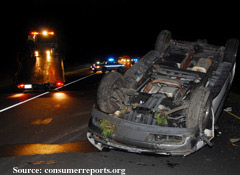How Do Rollovers Happen, and How to Reduce the Risk?
September 16, 2013 | Category: Vehicle Rollovers | Share"Vehicle rollovers often result in devastating personal injury or wrongful death when the vehicle roof collapses on the driver or passenger resulting in paralysis, broken bones, devastating injuries, or death," said Vehicle Rollover Attorney, Randall Spivey of Spivey Law Firm, Personal Injury Attorneys, P.A., Lee, Collier and Charlotte Counties.
 Any vehicle can rollover in an accident. However, SUVs have an increased susceptibility. The Department of Transportation Fatality Analysis Reporting System, as of 2010, reported that SUV safety record has improved, but it is still high. Rollovers accounted for 57% of SUV fatalities, 46% of pickup truck deaths and 24% of car fatalities.
Any vehicle can rollover in an accident. However, SUVs have an increased susceptibility. The Department of Transportation Fatality Analysis Reporting System, as of 2010, reported that SUV safety record has improved, but it is still high. Rollovers accounted for 57% of SUV fatalities, 46% of pickup truck deaths and 24% of car fatalities.
Stability control can reduce the rollover risk by 75% for SUVs, and 72% for cars according to the Insurance Institute for Highway Safety (IIHS). Ford and its former divisions, Volvo and Land Rover, can detect a rollover in progress and intervene to stop it. For the model year 2012, the U.S. government has mandated that all new vehicles have this technology.
How do Rollovers Happen?
Although any vehicle can rollover, vehicles which are "top heavy", with a higher center of gravity such as taller, narrower SUVs, vans and pickups, are more susceptible to rollovers than traditional cars. When a vehicle rounds curves, forces shift its center of gravity, thus having an effect on the vehicle's balance, according to Consumer Reports. "The lateral forces increase with speed and also with rapid changes of direction--for example, when a driver makes too sharp a turn one way and then overcorrects the other way. Those transitions can set up a pendulum effect, with larger and larger swings and an eventual loss of control."
Consumer Reports further reports that single vehicle rollovers are not generally caused by "over correcting" but by "tripping". Tripping can happen when a vehicle hits a curb, soft shoulder or potholes.
How To Reduce the Risk of a Rollover?
NHTSA reports there are five things a driver can do to reduce the risk of rollover:
-
Avoid conditions that could lead to loss of vehicle control. These conditions include driving under the influence of alcohol or drugs; driving when excessively drowsy; and speeding.
-
Be careful on rural roads.
-
Avoid extreme panic-like steering. NHTSA advises, "If your vehicle should go off the roadway, gradually reduce the vehicle speed and then ease the vehicle back onto the roadway when it is safe to do so."
-
Maintain tires properly and replace them when necessary.
-
Load vehicles properly. When loaded down with additional weight -- such as passengers, luggage, and equipment -- SUVs become less stable. The extra weight, which typically rides above an SUV's center of gravity, makes the vehicle tip more easily.
Florida Vehicle Rollover Attorney, Randall L. Spivey is a Board Certified Civil Trial Attorney – the highest recognition for competence bestowed by the Florida Bar and a distinction earned by just one (1%) percent of Florida attorneys. He has handled over 2,000 personal injury and wrongful death cases throughout Florida. For a free and confidential consultation to discuss your legal rights, contact the Spivey Law Firm, Personal Injury Attorneys, P.A., in Lee County at 239. 337.7483 or toll free at 1.888.477.4839, or by email to Randall@SpiveyLaw.com. Visit SpiveyLaw.com for more information. You can contact Spivey Law Firm, Personal Injury Attorneys, P.A. in Charlotte County at 941.764.7748 and in Collier County 239.793.7748.

